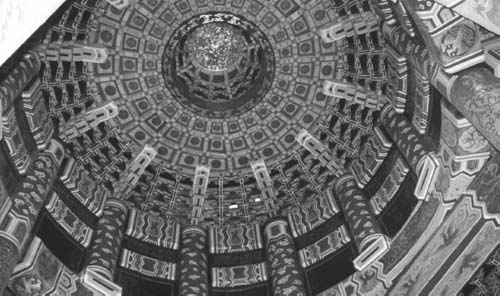Confucianism, the Literati, and Chinese Imperial TraditionsHolidays and Regular Observances |
Could you describe an example of an annual CIT ritual occasion in greater detail? |
At the Temple of Heaven in Beijing, a major event occurred at the winter solstice. Preparations commenced two months in advance. With five days to go, authorities inspected the animals to be offered. The next day they prepared the hall in which the emperor would spend a day in spiritual preparation, and the day after that the emperor began his abstinence. A procession made its way from the Forbidden City to the Temple, commoners taking care not to look at the royal person as he passed by. The emperor spent that day and night in the so-called Hall of Abstinence, a large complex to the west of the main north-south axis and about halfway between the Altar of Heaven to the south and the Hall of Harvest Prayer at the north of the compound. He bathed ritually and fasted for a day. (Later emperors often prepared in the Forbidden City itself.) Two days before the solstice, ritualists made final preparation of all ceremonial objects for the emperor’s review. The day before the solstice, the emperor left the Hall of Abstinence and proceeded to the Altar of Heaven to honor Shang Di and his own royal forebears with incense and bowing, and then returned the Hall of Abstinence.
Early the next day, he began a nine-part ceremony. At the round Altar of Heaven, where his ancestors’ spirit tablets were arrayed, animals were sacrificed and he paid obeisance to the ancestors. Offerings included silk and jade as well as the sacrificial meats. To music and dancing, he presented wine to Shang Di and the spirits in the first of three such offerings. After the emperor bade the sacred presences farewell he withdrew to an observation dais, while officials consigned the offerings to a furnace. The ceremonies ended with the emperor exiting by the south gate and returning to the Forbidden City.

Interior of the dome of the Temple of Heaven’s Hall of Harvest Prayer in Beijing, showing two of the four large floor-to-dome columns (extreme right and left) representing the seasons, and several of the inner circle of twelve shorter columns symbolizing the months. At the oculus are the dragon and phoenix intertwined.
